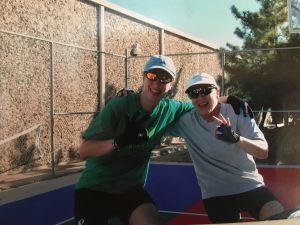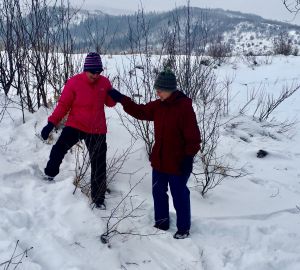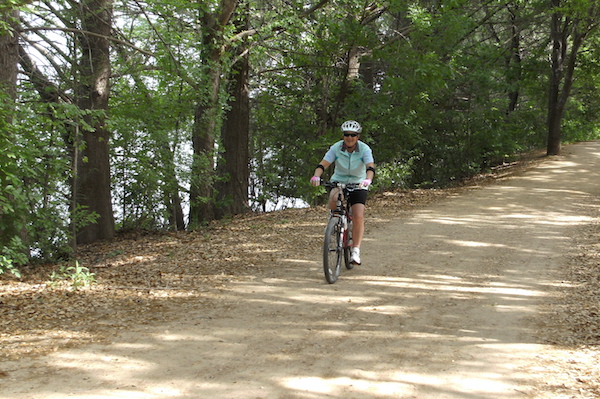Written by Lorraine Wilson, Davis Phinney Foundation Ambassador
There is much to say about optimism, a positive attitude and good old laughter when it comes to leading a healthy life. Many studies have shed light on how a positive attitude helps one develop self-efficacy and strong relationships. Optimism, in turn, helps with daily coping and seeing that proverbial glass as half full. But, what’s all of this got to do with fish?
I discovered Fish! years ago when researching materials that would help my college students learn positive leadership practices while engaging meaningfully with others. Shortly thereafter, I learned that the Fish! principles were being taught nearby at a large, regional healthcare organization and medium-sized local business. I enjoyed the book and training video and decided if it was good enough for them to use in business, then it was good enough for me to bring into the classroom. Yes, some naysayers find these practices overly simplistic, but bear with me.
Crazy as it may sound, these principles arose from the selling antics of the fishmongers at Pike Place Fish Market in Seattle, Washington. Their enthusiasm while working very early every morning in typically cold, smelly and strenuous conditions was contagious during the hours they manned the market to successfully sell pounds upon pounds of fish.
This Fish! philosophy includes four simple yet profound practices that help people love what they do, particularly in the workplace.
Choose Your Attitude
The fish market employees were aware that they chose their attitude daily. They could act bored, tired and grumpy or they could choose to act differently and be happily successful, maybe even world famous!
Play
How do these employees have such high morale in a smelly, often cold and damp job? They play! Having fun at work makes the time together more enjoyable and energizes not only the employees but also the customers. This synergy consistently boosts feelings of “I love what I do.”
Make Their Day
Engagement. That is what happens when an employee interacts meaningfully with a customer. I would add that engagement helps employees and co-workers share the workload in an effective manner, thus making their day less stressful and their work more meaningful.
Be Present
We all know what absenteeism is. Did you know there’s such a thing as presenteeism? It’s when your body shows up to work, but you’re really not there in mind or spirit. Work is half-done, at best, and your bad attitude is hanging out. It’s like being the proverbial bad apple incarnate. When you successfully choose your attitude, play and make their day, then you can truly be present! Being there for others means you listen to understand instead of to reply, you avoid judgment and you’re respectful of the people around you.
What do these practices have to do with Parkinson’s?
They contribute in a unique way to self-efficacy and building a strong support system, both of which shed a positive light on living with Parkinson’s. If you think Parkinson’s stinks, and no one’s going to argue with you about that, then read on.
“Self-efficacy is the belief we have in our own abilities, specifically our ability to meet the challenges ahead of us… (Akhtar, 2008).”
Choose Your Attitude
Do you hate Parkinson’s? That’s understandable, but you can choose to re-frame your attitude into a positive one so you aren’t eaten up with negativity, which can make others uncomfortable when they’re around you.
There may well be some eyebrows raised when I say I thought of the story of Pollyanna when I considered how best to choose a good attitude about Parkinson’s. Why? Pollyanna taught all manner of folks how to play the glad game and why it’s important. She recalled living abroad with her parents who were missionaries and wanting a doll to come in the next missionary barrel only to learn that a pair of crutches arrived instead. Puzzled, she crinkled her nose to think hard when her dad asked her what was good about the crutches. “I don’t need them!” she said, and she was glad about that.
As I (begrudgingly) accepted the “new” me, my version of Pollyanna’s glad game increased my optimism and allowed me to choose joy (a good attitude in my book) in how I approached Parkinson’s day-to-day. It also helped me connect with friends and family by telling them about my diagnosis and reaching out to others with Parkinson’s in a local support group.
Play
 Yes, play! Exercise! Dance! Go cycling! Box! I feel fortunate that exercise has been a large part of my life, so it seemed natural to learn what was recommended for Parkinson’s. Resistance training had never been my strong suit (pun intended), but by beginning regular strength training I felt more empowered to tackle both physical and mental tasks.
Yes, play! Exercise! Dance! Go cycling! Box! I feel fortunate that exercise has been a large part of my life, so it seemed natural to learn what was recommended for Parkinson’s. Resistance training had never been my strong suit (pun intended), but by beginning regular strength training I felt more empowered to tackle both physical and mental tasks.
Seek out resources to develop your personal exercise plan and remember to build in some play time. A family bike ride to a nearby park for a picnic is an investment in building positive memories. In contrast, putting yourself on the back seat of a tandem so you have to keep pace with the rider in front has been shown to be beneficial to symptom management, even if short term. Exercise intensity is the key to effective results.
Maybe exercise hasn’t been your cup of tea and all of this sounds daunting, so you succumb to analysis-paralysis. What kind of exercise? How often? How hard? I suggest you find something you will do and do it! This may mean you start by putting one foot in front of the other as you walk across the room, then across the yard and then around the block. It might also mean that you start with a referral to a physical or occupational therapist or personal trainer. I also suggest you get outdoors to enjoy the air and scenery and the companionship of an accountability buddy (two and four-legged buddies are equally encouraged). Find an exercise that you can sense as play so it’s both fun and fulfilling.
Make Their Day
You can make your day as well as someone else’s since you are now present and accounted for as a person with Parkinson’s by working on that good attitude and willingness to engage in daily movement. Why would you do this? Because you believe you can. Does this contribute to building and maintaining strong relationships? From my personal experience, the answer is “You betcha!”
My friends are not afraid to ask about Parkinson’s because I’m not afraid to talk about it. They help make my day by working out with me or asking how I’m doing and actually listening to my answer because I temper it with optimism instead of constant and negative “woe is me” talk. I strive to actively listen to them, too. It’s a win-win situation.
Be Present
Do you have Parkinson’s? Be right here, right now.
 I don’t know about your experience upon receiving a Parkinson’s diagnosis, but my mind shifted to worst-case scenarios. I have learned that this happens to many of us. I quickly recognized that the negativity basement was not a good place to dwell if I was going to live well in mind, body and spirit today. I wanted to be present for myself and those nearest to me, so I adjusted my attitude as I adjusted to my new meds and the new-to-me reality of striving to live well today with Parkinson’s.
I don’t know about your experience upon receiving a Parkinson’s diagnosis, but my mind shifted to worst-case scenarios. I have learned that this happens to many of us. I quickly recognized that the negativity basement was not a good place to dwell if I was going to live well in mind, body and spirit today. I wanted to be present for myself and those nearest to me, so I adjusted my attitude as I adjusted to my new meds and the new-to-me reality of striving to live well today with Parkinson’s.
Choosing to be present increased my confidence (self-efficacy) to handle daily challenges. My family, friends and co-workers have always helped me believe I had what it took to be successful in life and at work. In turn, I wanted to be there for them and did not want the Parkinson’s diagnosis to change that; it was time to successfully manage my changing circumstances. This acknowledgment helped me be present and put effort into tackling issues as they arose.
What’s Next?
If you’re already connecting to these practices, that’s great. Perhaps you claim one or two of them but want to work on the others because they make sense to you. That’s wonderful, too! If you want to begin incorporating these practices into your life, then make the decision and then make a commitment to yourself that you will. Maybe you will choose to write it down as a promise to yourself and date it, maybe you’ll use it as a daily prompt in your journal so you can reflect on it or maybe you’ll introduce it to your family or support group and invite others to join you. This philosophy might not be the right fit for everyone, but it has been inspiring and grounding to me as I do my best to live well and thrive with Parkinson’s.
 Lorraine Wilson is one of the newest members of our cohort of Davis Phinney Foundation Ambassadors. Our Ambassadors are “living well leaders” who share resources and information throughout their local and regional communities to help people take action and improve their quality of life with Parkinson’s. Connect with one of our Ambassadors and begin your journey today of living well with Parkinson’s!
Lorraine Wilson is one of the newest members of our cohort of Davis Phinney Foundation Ambassadors. Our Ambassadors are “living well leaders” who share resources and information throughout their local and regional communities to help people take action and improve their quality of life with Parkinson’s. Connect with one of our Ambassadors and begin your journey today of living well with Parkinson’s!


